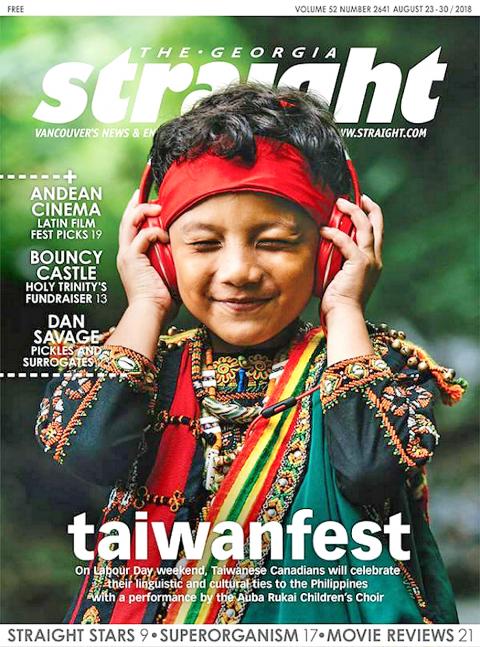Last week’s edition of Vancouver’s largest free weekly, The Georgia Straight, featured a Rukai child from Pingtung’s Sandimen (三地門) area, who was to perform at this year’s Taiwanfest.
Taiwanfest is an annual music and cultural event that takes place in Vancouver and Toronto. This year’s edition was in Toronto from Friday to Sunday last week and is now in Vancouver, where it ends tomorrow.
The Auba Rukai Children’s Choir performed at the Vancouver opening ceremony yesterday.

Photo: CNA
The festival is especially important this year, given the setbacks Taiwan has faced internationally due to pressure from China, organizers said.
The festival has been held in Vancouver every year since 1990 and in Toronto since 2006.
The Toronto festival is held in the last week of August at the city’s Harborfront Center on Lake Ontario.
In both cities, the festival regularly attracts more than 200,000 people, and it is one of Canada’s largest English-Chinese festivals, organizers said.
Initially a music festival only, Taiwanfest today is also a celebration of Taiwanese food and many other aspects of Taiwanese culture.
Some of Taiwan’s best-known musicians participate in the festival every year, and the festival is regularly attended by Canadian politicians and other prominent Canadian figures.
In 2016, Asian-Canadian Special Events Association managing director Charlie Wu (吳權益) created a Dialogues With Asia series, in which Taiwan shares the festival stage with a different Asian culture each year.
In its first two years, the series looked at Hong Kong culture and Japanese culture.
This year, the festival is celebrating Philippine culture, Wu said, adding that Vietnam and South Korea would follow.
The theme of this year’s festival is “Fete with the Philippines,” with the Chinese version of the theme “Taiwan Thinks Philippines” (台灣想菲) — being a homophone for the expression “Taiwan wants to fly” (台灣想飛), showing the nation’s desire to connect with the world, Wu said.
Taiwan and the Philippines are more than just neighbors and there are links between the languages of both countries’ Aborigines, he said.
The focus on making the festival more diverse and multicultural — aspects of Canadian society that the country is often celebrated for — has won international approval for the festival, he said.
“Only by celebrating Taiwan’s relationships with other countries can we demonstrate the importance of its existence,” he said.
The festival lasts only two weekends across the two cities, but preparations take about a year, he said, adding that the organizers are mostly aged under 30 and all are passionate about telling Taiwan’s story to the world.
This year’s festival also marks the first time that Taiwan’s small farming villages and its new immigrant communities have been highlighted, he said.
This event also features performances by 13-year-old Taiwanese pianist Chan Cheng-an (詹程安) and Juno-award-winning Canadian-Filipino actor Warren Dean Flandez.

Taiwanese can file complaints with the Tourism Administration to report travel agencies if their activities caused termination of a person’s citizenship, Mainland Affairs Council Minister Chiu Chui-cheng (邱垂正) said yesterday, after a podcaster highlighted a case in which a person’s citizenship was canceled for receiving a single-use Chinese passport to enter Russia. The council is aware of incidents in which people who signed up through Chinese travel agencies for tours of Russia were told they could obtain Russian visas and fast-track border clearance, Chiu told reporters on the sidelines of an event in Taipei. However, the travel agencies actually applied

New measures aimed at making Taiwan more attractive to foreign professionals came into effect this month, the National Development Council said yesterday. Among the changes, international students at Taiwanese universities would be able to work in Taiwan without a work permit in the two years after they graduate, explainer materials provided by the council said. In addition, foreign nationals who graduated from one of the world’s top 200 universities within the past five years can also apply for a two-year open work permit. Previously, those graduates would have needed to apply for a work permit using point-based criteria or have a Taiwanese company

The Shilin District Prosecutors’ Office yesterday indicted two Taiwanese and issued a wanted notice for Pete Liu (劉作虎), founder of Shenzhen-based smartphone manufacturer OnePlus Technology Co (萬普拉斯科技), for allegedly contravening the Act Governing Relations Between the People of the Taiwan Area and the Mainland Area (臺灣地區與大陸地區人民關係條例) by poaching 70 engineers in Taiwan. Liu allegedly traveled to Taiwan at the end of 2014 and met with a Taiwanese man surnamed Lin (林) to discuss establishing a mobile software research and development (R&D) team in Taiwan, prosecutors said. Without approval from the government, Lin, following Liu’s instructions, recruited more than 70 software

Taiwanese singer Jay Chou (周杰倫) plans to take to the courts of the Australian Open for the first time as a competitor in the high-stakes 1 Point Slam. The Australian Open yesterday afternoon announced the news on its official Instagram account, welcoming Chou — who celebrates his 47th birthday on Sunday — to the star-studded lineup of the tournament’s signature warm-up event. “From being the King of Mandarin Pop filling stadiums with his music to being Kato from The Green Hornet and now shifting focus to being a dedicated tennis player — welcome @jaychou to the 1 Point Slam and #AusOpen,” the